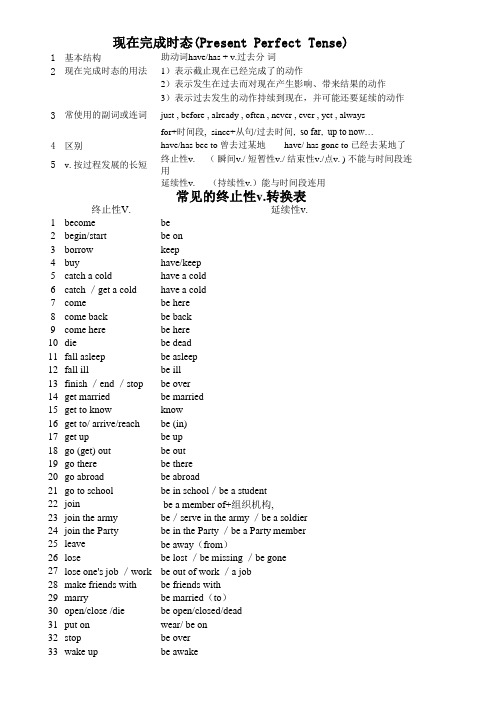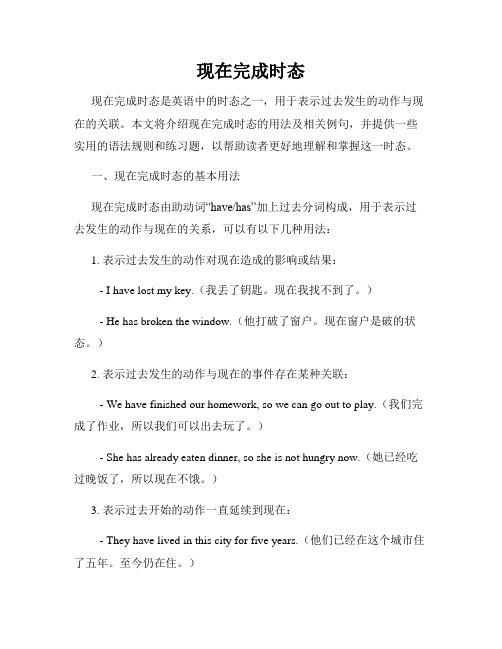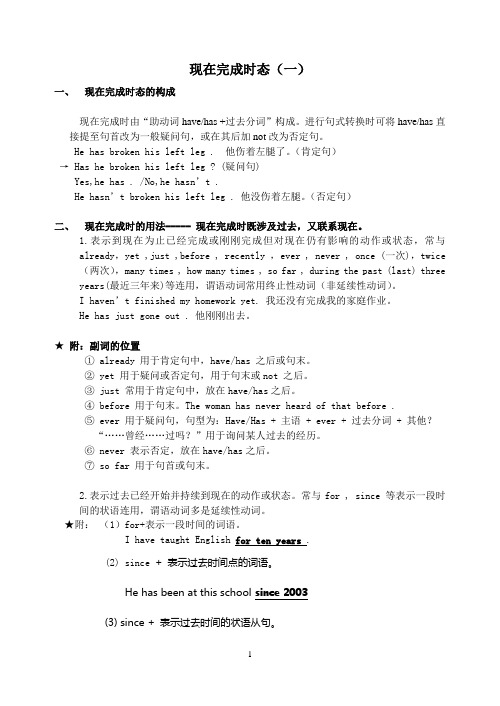现在完成时态
(完整版)现在完成时态讲解

• 特殊: • am/is-was-been are-were-been, • do (does)-did-done go-went-gone • see-saw-seen • show-showed-shown (showed)
③ She has gone home. 她回家去了。
注意:1)该句式中的have或has是助动词,has用于第三人称单数,其它人称 一律用have。
2)该句式中have(has)和过去分词之间可用just插入。 3)把该句式译成汉语时,往往用“已经”,“刚刚”,“过”或“了”等.
2.现在完成时一般疑问句式是把助动词have或has提到主语之前。 如: ④ Have you read this story book yet? 你读过这本故事书吗? ⑤ Has he eaten that apple yet? 他吃那个苹果了吗?
动词的过去分词的规则变化
动词的过去分词的规则变化,在动词后加ed,规则变化有以下四种: ①原形+ed 如:worked, passed ②词尾是e时,直接加d 如:liked lived ③若词尾为“辅音字母加y”,则改y为i加ed;词尾 为“元音字母+y”时, 直接加d。如: played stayed studied cried ④末尾只有一个辅音字母的重读闭音节是,双写最后一个辅音字母加ed. 如: stopped dropped
• put-put-put
cut-cut-cut
• let-let-let
set-set-set
• beat-beat-beat
hit-hit-hit
• hurt-hurt-hurt
spit-spit-spit
• rid-rid-rid
现在完成时态(Present Perfect Tense)

1基本结构助动词have/has + v.过去分 词2现在完成时态的用法1)表示截止现在已经完成了的动作2)表示发生在过去而对现在产生影响、带来结果的动作3)表示过去发生的动作持续到现在,并可能还要延续的动作3常使用的副词或连词just , before , already , often , never , ever , yet , always for+时间段, since+从句/过去时间, so far, up to now…4区别have/has bee to 曾去过某地 have/ has gone to 已经去某地了5v.按过程发展的长短终止性v. ---( 瞬间v./ 短暂性v./ 结束性v./点v. ) 不能与时间段连用延续性v. --- (持续性v.)能与时间段连用终止性V.延续性v.1becomebe 2begin/startbe on 3borrowkeep 4buyhave/keep 5catch a coldhave a cold 6catch /get a coldhave a cold 7comebe here 8come backbe back 9come herebe here 10diebe dead 11fall asleepbe asleep 12fall illbe ill 13finish /end /stopbe over 14get marriedbe married 15get to knowknow 16get to/ arrive/reachbe (in)17get upbe up 18go (get) outbe out 19go therebe there 20go abroadbe abroad 21go to schoolbe in school /be a student 22joinbe a member of+组织机构,23join the armybe /serve in the army /be a soldier 24join the Partybe in the Party /be a Party member 25leavebe away (from )26losebe lost /be missing /be gone 27lose one's job /workbe out of work /a job 28make friends withbe friends with 29marrybe married (to )30open/close /diebe open/closed/dead 31put onwear/ be on 32stopbe over 33wake up be awake现在完成时态(Present Perfect Tense)常见的终止性v.转换表时间段连用。
现在完成时态

现在完成时态现在完成时态是英语中的时态之一,用于表示过去发生的动作与现在的关联。
本文将介绍现在完成时态的用法及相关例句,并提供一些实用的语法规则和练习题,以帮助读者更好地理解和掌握这一时态。
一、现在完成时态的基本用法现在完成时态由助动词“have/has”加上过去分词构成,用于表示过去发生的动作与现在的关系,可以有以下几种用法:1. 表示过去发生的动作对现在造成的影响或结果:- I have lost my key.(我丢了钥匙。
现在我找不到了。
)- He has broken the window.(他打破了窗户。
现在窗户是破的状态。
)2. 表示过去发生的动作与现在的事件存在某种关联:- We have finished our homework, so we can go out to play.(我们完成了作业,所以我们可以出去玩了。
)- She has already eaten dinner, so she is not hungry now.(她已经吃过晚饭了,所以现在不饿。
)3. 表示过去开始的动作一直延续到现在:- They have lived in this city for five years.(他们已经在这个城市住了五年。
至今仍在住。
)- I have known her since we were children.(我认识她从我们还是孩子的时候。
至今仍然认识。
)二、现在完成时态的语法规则1. 肯定句:主语 + have/has + 过去分词- I have watched that movie before.(我以前看过那部电影。
)- She has visited Paris many times.(她多次去过巴黎。
)2. 否定句:主语 + have/has + not + 过去分词- I have not seen him today.(我今天没有见到他。
)- They have not finished their work yet.(他们还没有完成工作。
现在完成时态讲解和练习

现在完成时态讲解及练习一、现在完成时的构成肯定句:主语+have/ has + done (过去分词)+其它He has lived in Shenzhen for 4 years.一般疑问句:Have/ Has +主语+ done (过去分词)+其它Has he lived in Shenzhen for 4 years?否认句: 主语+have/ has+ not + done (过去分词)+其它He has not finished his homework.过去分词的构成方法如下 :1.一般情况下,直接在动词原形后面加 –ed.work---worked answer---answered obey---obeyed want---wanted 2.以不发音的 -e 结尾的动词只加 –d.Move---moved hope---hoped divide---divided 3.字尾是辅音+y 的动词。
那么将y 改i 加ed. study---studied tidy---tidied satisfy---satisfied4.以重读闭音节结尾的词,这些词的末尾只有一个辅音字母时,双写这个辅音字母,再加 –ed. stop---stopped regret--- regretted drop---dropped不规那么动词过去式与过去分词分类记忆表一、AAA. 〔原形,过去式和过去分词一致〕二、ABB 〔过去式和过去分词一致〕3) 过去式、过去分词-t 替换原形-d6) 过去式、过去分词改为-elt二、现在完成时标志词:recently; recent years; these days/ years; lately; since; for+时间段;in the past few years; ever since; in the last five months; up to now; since then; so far; ever; never, yet; once; twice; already; before; just already (已经): 用于肯定句I have already posted the letter .yet(已经): 用于否认句,疑问句He hasn’t done his homework yet.just(刚刚)They have just left.ever(曾经)Have you ever been to Beijing ?never(从不)I have never seen him .before(以前)Have you seen the film before?since(自从…以来)I’ve worked in the school si nce 1999.for(长达)He’s lived in Shenzhen for 6 years.in the past several days / weeks/ years(在过去的…)recently(最近)I have not written to my parents recently.so far(到目前为止)So far she has learned 5 English songs.up to now(到目前为止)this morning/month/year(今天早上/这个月/今年)三、现在完成时的用法1)现在完成时表示过去发生的动作,并对现在有影响。
现在完成时态

现在完成时态(一)一、现在完成时态的构成现在完成时由“助动词have/has +过去分词”构成。
进行句式转换时可将have/has直接提至句首改为一般疑问句,或在其后加not改为否定句。
He has broken his left leg .他伤着左腿了。
(肯定句)→ Has he broken his left leg ? (疑问句)Yes,he has . /No,he hasn’t .He hasn’t broken his left leg . 他没伤着左腿。
(否定句)二、现在完成时的用法----- 现在完成时既涉及过去,又联系现在。
1.表示到现在为止已经完成或刚刚完成但对现在仍有影响的动作或状态,常与already,yet ,just ,before , recently ,ever , never , once (一次),twice (两次),many times , how many times , so far , during the past (last) three years(最近三年来)等连用,谓语动词常用终止性动词(非延续性动词)。
I haven’t finished my homework yet. 我还没有完成我的家庭作业。
He has just gone out . 他刚刚出去。
★附:副词的位置① already 用于肯定句中,have/has 之后或句末。
② yet 用于疑问或否定句,用于句末或not 之后。
③ just 常用于肯定句中,放在have/has之后。
④ before 用于句末。
The woman has never heard of that before .⑤ ever 用于疑问句,句型为:Have/Has + 主语 + ever + 过去分词 + 其他?“……曾经……过吗?”用于询问某人过去的经历。
⑥ never 表示否定,放在have/has之后。
英语中考现在完成时态

英语中考专项现在完成时态现在完成时态(Present Perfect Tense)用于表示过去发生的动作或事件与现在的关系,强调的是过去的经验、经历或状态对当前的影响。
它通常与包含"have/has + 过去分词"的句式结构一起使用。
现在完成时态的用法如下:1. 表示过去发生的动作或事件对当前造成的影响。
2. 强调过去的经验或经历与现在的联系。
3. 表示持续到现在的动作或情况。
4. 用于表示刚刚发生或完成的动作。
现在完成时的基本句型现在完成时态的肯定句构成是"主语+助动词 have/has(根据主语的人称和数选择适当的形式)+动词的过去分词",疑问句构成是"助动词 have/has + 主语 + 动词的过去分词?",否定句构成是"主语 + 助动词 have/has(根据主语的人称和数选择适当的形式)+ not + 动词的过去分词"。
以下是一些例子:肯定句:- I have read that book.- She has finished her work.- They have visited Europe before.疑问句:- Have you eaten breakfast yet?- Has he watched this movie before?- Have they ever been to Japan?否定句:- She hasn't started her project yet.- We haven't seen each other in a long time.- They haven't decided where to go for vacation yet.现在完成时的主要用法1)表示过去发生的某一动作对现在造成的影响或结果。
常和副词already, yet, never, ever, before just等连用。
现在完成时态
一、现在完成时的结构关1. 肯定式现在完成时由“助动词have/has+过去分词”构成,当主语为第三人称单数时,用“has+过去分词”,其他人称用“have+过去分词”;规则动词的过去分词的构成与动词过去式相同,不规则动词的过去分词另归纳。
have可缩写为’ve,has可缩写为’s。
如:They’ve worked in the factory for ten years.他们在这个工厂工作十年了。
He’s been there before, hasn’t he?他以前去过那儿,对吗?2. 否定式现在完成时的否定式就是在has/have后加not,have not可缩写为haven’t,has not可缩写为hasn’t。
如:I haven’t found my lost cat. 我还没有找到我丢失的猫。
She hasn’t finished her homework yet. 她还没有完成她的家庭作业。
3. 疑问式现在完成时的疑问式就是把助动词has,have提到句首,反意疑问式也用has,have,它们的肯定回答常用“Yes, 主语+has/have”,否定回答用“No, 主语+hasn’t/haven’t”,有时肯定回答也用“Yes, already”否定回答也用“No, not yet”等形式。
如:—Have you been to Dalian? 你去过大连吗?—No, not yet. 不,还没去过。
He has taught you English since two weeks ago, hasn’t he?他从两周前就教你们英语了,对吗?二、现在完成时的用法关1.已完成用法:表示过去发生或已经完成的某一动作对现在造成的影响或结果,这种用法中的谓语动词一般为短暂性动词。
如:He has had lunch already. 他已经吃过午餐了。
(现在是饱的)I have read the book many times.这本书我看过多次。
现在完成时态
现在完成时态1、现在完成时的定义:现在完成时是表示在过去发生但与现在情况有联系的动作或状态的时态。
2、现在完成时的构成:现在完成时是由“助动词have/has+动词过去分词”构成的。
①助动词have/has可以与主语缩写为’ve/’s。
e.g. I have → I’ve We have → We’ve He has → He’s It has → It’s②规则变化的过去分词与动词过去式一样。
③不规则变化的动词过去分词见表。
(一)肯定式主语+助动词have /has +过去分词+其它e.g. I have had lunch. 我已经吃过午饭了。
He has gone to Beijing. 他去北京了。
(二)否定式主语+助动词have /has+not+过去分词+其它(一)现在完成时态1、现在完成时的定义:现在完成时是表示在过去发生但与现在情况有联系的动作或状态的时态。
2、现在完成时的构成:现在完成时是由“助动词have/has+动词过去分词”构成的。
①助动词have/has可以与主语缩写为’ve/’s。
e.g. I have → I’ve We have → We’ve He has → He’s It has → It’s②规则变化的过去分词与动词过去式一样。
③不规则变化的动词过去分词见表。
3、现在完成时的基本句型。
①陈述句肯定形式。
e.g. I have had lunch. 我已经吃过午饭了。
He has gone to Beijing. 他去北京了。
②陈述句否定形式。
(在助动词have/has后+not,可缩写为haven’t/hasn’t)e.g. I haven’t had lunch. 我还未吃午饭。
He hasn’t gone to Beijing. 他还没有去北京。
(三)一般疑问式助动词Have /Has +主语+过去分词+其它?e.g .1. Have you had lunch? 你吃过午饭了没?--Yes, I have. -- No, I haven’t.2. Has he gone to Beijing? 他去过北京了没有?--Yes, he has. -- No, he hasn’t.否定回答还可以用:No, not yet. / No, never. / No, not even once等。
初中英语现在完成时态
现在完成时态构成 : 主语 + have/has + 过去分词 + 其他。
否定式 : 主语 + haven't/hasn't + 过去分词 + 其他。
一般疑问式 : Have /Has + 主语 + 过去分词 + 其他简略答语 : Yes, 主语 + have/has.(肯定No, 主语 + haven't/hasn't.(否定一、现在完成时态用法一:动作发生在过去,一直延续到现在,可能还会继续。
(如图●————————————现在该用法中常用词:for, since, how long. 例如:for 后跟时间段 , since 后跟过去时间点或者是过去时态的句子。
How long have you learned English?I have learned English for ten years.I have learned Englishsince ten years ago.注意:此用法中还要注意,因为要表示动作一直延续到现在,所以主句中的动词要选择表延续性的动词。
例如:He has been dead for ten years.(be dead是 die 的延续性词He has been away for two hours. (be away是 leave 的延续性词常见瞬间动词与延续动词的转换:come / go / arrive/ get to/reach -- be in s.p.leave – be away buy – have die – be dead borrow – keep join sth.– be in sth. come back – be backbegin to do sth – do sth ( begin to work – workbegin - be on become sth. – be sth.二、现在完成时用法二:表示过去某个动作发生过,对现在造成影响。
现在完成时态讲解及练习
现在完成时态讲解及练习现在完成时态讲解及练习1、概念:表示某个动作或状态发生在过去,但对现在造成了影响,这个动作或状态也可能已经结束,也可能还要继续下去。
2、现在完成时态的构成:助动词have / has +动词的过去分词。
当主语为第三人称单数用has,其余人称用have。
否定句在助动词have/ has 后加not ;疑问句则把助动词Have/ Has 提放到主语之前。
如:I have worked here for ten years . She hasn't been to the Great Wall . Have you been to Beijing ?3、现在完成时态的用法(1)、表示过去某时刻发生的动作对现在造成的影响或结果,常与already, yet, just , ever, never…..before, this morning, now , today , so far , in the last/ past+时间段、over +时间段, recently,by+现在时间等连用如:Tom has already finished his homework. We have had two classes this morning.(2)、表示从过去某一时刻开始,一直延续到现在的动作或状态,常与for 引导的一段时间或since 引导的时间点或过去时间状语从句连用。
如:Mr Green has lived in China for five months.Mr Green has lived in China since five months ago.Mr Green has lived in China since he came to China.4、have/ has been to 与 have/ has gone to 区别(1)、 have/ has been to 表曾去过某地(现在已不在该地),其后可接表次数的时间名词。
- 1、下载文档前请自行甄别文档内容的完整性,平台不提供额外的编辑、内容补充、找答案等附加服务。
- 2、"仅部分预览"的文档,不可在线预览部分如存在完整性等问题,可反馈申请退款(可完整预览的文档不适用该条件!)。
- 3、如文档侵犯您的权益,请联系客服反馈,我们会尽快为您处理(人工客服工作时间:9:00-18:30)。
一、时态讲解:现在完成时(1)构成:现在完成时由助动词have + 过去分词构成,助动词have 有人称和数的变化。
第三人称单数用has,其余用have.现在完成时的否定式直接在助动词后面加上not、疑问式是把助动词提到主语之前。
以study 为例,其(2)用法:1)现在完成时通常表示在说话之前已经完成的动作或存在的状态。
说话人强调的是该动作或状态对现在的结果或影响。
My daughter has just gone out. 我女儿刚出去。
I’m sure we’ve met before. 我肯定我们以前见过面。
She has arrived. 她到了。
2)表示持续到现在的动作或状态,往往和包括现在在内的表示一段时间的状语连用,如recently, already, just, lately, for…, since…,yet等。
如:I haven’t heard from her these days. 这些日子我没有收到她的信。
We haven’t seen you recently. 最近我们没有见到你。
They have been away for two years. 他们离开已经两年了。
She has been with us since Monday.★注意:a)since和for的区别since后接时间点,如1993,last term, yesterday, the time I got therefor后接一段时间,表示“长达多久”,如ten years, a while, two days等。
Exercise: 用since和for填空1. Jim has been in Ireland ______ Monday.2. Jill has been in Ireland ______ three days.3. His aunt has lived in Australia ______15 days.4. Mary is in her office. She has been there ______ 7 o'clock.5. India has been an independent country ______1974.6. The bus is late. They've been waiting ______ 20 minutes.7. Nobody lives in those houses. They have been empty ______ many years.8. Mike has been ill ______a long time. He has been in hospital ______ October.2)表示短暂意义的动词如arrive, leave, borrow, buy, begin, start, die等,在完成时当中不能和表示一段时间的状语连用,因为它们表示的动作不可能持续。
因此,不能说:He has come here for 2 weeks. ×The old man has died for 4 months. ×They have left only for 5 minutes. ×以上三句话可以改为:He has been here for 2 weeks.The old man has ______ _______ for 4 months.They have _____ _____ only for 5 minutes2)have (has) been 和have (has) gone的区别:表示“曾到过某地”要用“have (has) been”; 表示“已经去某地”要用“have (has) gone”。
试比较:Where has he been? 他刚才到哪里去了?(已经回来了)Where has he gone? 他上哪儿去了?(人不在)They have been to Canada. 他们到过加拿大。
(现在已经不在加拿大)They have gone to Canada. 他们到加拿大去了。
(可能在路上和已经到加拿大).3)现在完成时不能和表示过去的时间状语连用,如yesterday, last year, in 1976, two days ago, just now, when I came in,但可以和already, yet, sometimes, always, often, before, lately, recently, once, twice, ever, never等连用。
例如:She has already come. 她已经来了。
I haven’t read it yet. 我还没读过这个。
I have met him before. 我从前曾见过他。
Ma Hong has always been a good student. 马红一直是个好学生。
I have often seen him in the street. 我经常在街上看见他。
They have n ever been to Yan’an. 他们从未去过延安。
I haven't seen him lately. 我近来没看到他。
IExercise:I. Fill in the blanks with the proper form.1. I____ already ____ (see) the film. I ________ (see) it last week.2. _____ he ____ (finish) his work today? Not yet.3. My father ____ just ____ (come) back from work. He is tired now.4. Where’s Li Ming ? He __________ (go) to the teacher’s office.5. I __________ (work) here since I ______ (move) here in 1999.6. So far I _______________(make) quite a few friends here.7. How long ________ the Wangs ______________(stay) here ? For two weeks.8. I ________ just ___________ (finish) my homework.9. He ________ (go) to school on foot every day.10.____ you ______ (find) your science book yet?11. If it ____ (be) fine tomorrow, I'll go with you.12. The students ____________ (read) English when the teacher came in.13. Look! The monkey __________ (climb) the tree.14. My mother __________ (come) to see me next Sunday.15. I've lost my pen. _________ you ________ (see) it anywhere?II. Choose the best answer.1. How long have you _______ here?A. comeB. gotC. arrivedD. been2. My grandpa died _________.A. at the age of my 2B. for 2 yearsC. when I was 2.D. my age was 6.3. Jane has _____ to BeiJing. She will come back tomorrow.A. beenB. goneC. wentD. never been4. It is ten years _____ I last saw her.A. afterB. sinceC. forD. that5.--Who will go to the station to meet Lorry?--I will. I _____ her several times.A. metB. have metC. had metD. will meet6. --What a nice dress! How long _____ you _____ it?--Just 2 weeks.A. will, buyB. did, buyC. are, havingD. have, had7.--Do you know Lydia very well?--Yes, She and I _____ friends since we were very young.A. have madeB. have becomeC. have beenD. have turned8. The Smiths _______ in China for 8 years.A. has livedB. livedC. have beenD. live9. --Hello, this is Mr. Green speaking. Can I speak to Mr. Black?-- Sorry. He ______ the Bainiao Park.A. has been toB. has gone toC. went toD. will go to10. --____ you ever ____ to the US?-- Yes, twice.A. Have, goneB. Have, been C, Do, go D. were, goingIII. Rewrite the sentences.1. I have been to Macau before. (改为否定句)I _________ _________ been to Macau before.2. He hasn’t come to school because he was ill. (就划线部分提问)______ _______ he come to school?3. I bough a new bike just now. (用just改写)I ____ just ____ a new bike.4. We began to learn English three years ago.(改为同义句)We ____ ____English ____three years5. He has never surfed, _______ _______? (改成反意疑问句)6. They have been here since 2000. (对划线部分提问)_______ _______have they been here?7. The old man _________ last year. He has _______ _______for a year. (die) (动词填空)8. Miss Gao left an hour ago. (同义句转换)Miss Gao has _______ ________ ________ an hour ago.Ask the questions1) I have been there for two days.__________ _________ __________ you __________ __________?2) My father has lived here since 2000._________ _________ __________ your father _________ __________?3) He left here yesterday._________ ________ he _________ __________?4) They bought a book two hours ago.__________ ___________ they __________ a book?Use “never, ever, already, just, yet, for, since” to fill in the blanks.1. I have _______ seen him before, so I have no idea about him.2. Jack has _________ finished his homework.3. Mr. Wang has taught in this school ________ ten years.4. “Have you ________ seen the film?” “No, I have ________ seen it.”5. “Has the bus left _______?” “Yes, it has _________ left.”现在完成时练习题及答案一、翻译下列句子:你曾经吃过鱼和薯条吗?2. 我刚刚丢了我的化学书。
